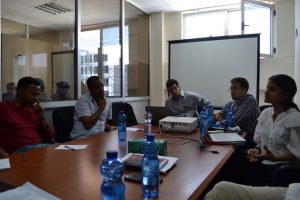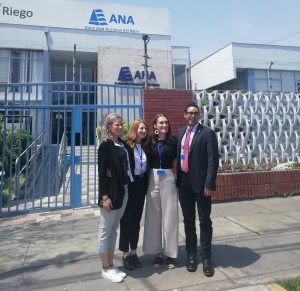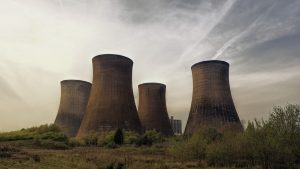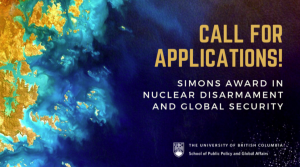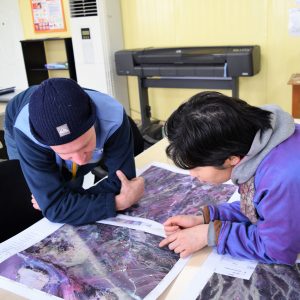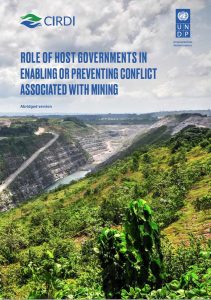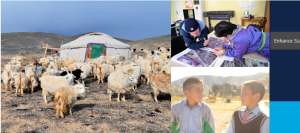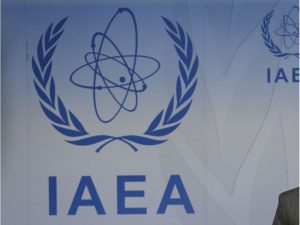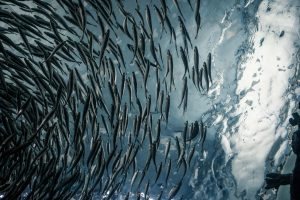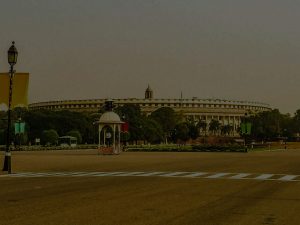Billions Lost as Illicit Fisheries Trade Hurting Nations Who Can Afford it Least
In a new paper, Professor Rashid Sumaila, SPPGA and UBC Institute for the Oceans and Fisheries, speaks on the several million tonnes of unreported fish catches each year, which cost legitimate markets between “$9 billion and $17 billion in trade each year”.
Global Policy Project: Developing an Equity Lens with the City of Vancouver
As part of their second year Master of Public Policy and Global Affairs (MPPGA) program, a team of six students has begun their Global Policy Project (GPP 590B) with a domestic focus, consulting with the City of Vancouver to apply an equity lens to their Climate Emergency Response Plan. Team Members: Schyler Edmundson, Shivangi Khanna, Alexandra […]
Empires Built On Sand: On The Fundamental Implausibility Of Reactor Safety Assessments And The Implications For Nuclear Regulation
SPPGA Professor Ramana has co-authored “Empires built on sand: On the fundamental implausibility of reactor safety assessments and the implications for nuclear regulation”. His article takes an exploratory approach to analyze the nature of expert reactor assessments, positing that a misunderstanding of said assessments have far-fetching implications for nuclear policy and regulation.
When It Comes to Nuclear Power, Could Smaller Be Better?
SPPGA Professor Ramana is quoted in a Yale Environment 360 article which ruminates on the plausibility of small-scale nuclear reactors and their compatibility with renewable options. With prices plummeting, nuclear plants are faced with unprofitability due to fierce competition.
From Australia, a Burning Message for Fossil Fuel Producers
Forest fires are an urgent call to move away from fossil fuels. Several approaches can push the sector to play a more positive role in the transition, says Professor Philippe Le Billon (SPPGA & UBC Geography). Learn more at Institute for Research on Public Policy.
Mining and Morality: Upcoming Lecture at UBC’s Green College
In an article with The Source/La Source Newspaper, Assistant Professor Nadja Kunz, SPPGA and Norman B. Keevil Institute of Mining Engineering Associate Professor, speaks to B.C.’s increasing dependence on mining, and the need for “an interdisciplinary approach that fosters awareness of local sustainability and morality”.
First Nations Lose Latest Appeal Against Trans Mountain Pipeline Expansion
The Federal Court of Appeal’s ruling could be the start of a much wider grass-roots conflict, according to SPPGA Professor George Hoberg.
Amid Forestry Struggles, Panel Finds ‘Surprising’ Consensus on Old-Growth Logging Concerns in B.C.
SPPGA Professor George Hoberg speaks to The Narwhal on the province’s last intact ancient forests, which are being cut down faster than the Amazon.
Global Policy Project: Implementing a Roadmap for Environmental and Social Impact Assessment of Ethiopia’s Mining Sector
The fieldwork component for the 2019-2020 Global Policy Projects has now been completed by seven UBC Master of Public Policy and Global Affairs (MPPGA) student teams who worked with clients organizations on a policy problem in ten different countries throughout December 2019. Find below a reflection from students whose project focused on improving resource governance […]
Political Consequences: Here’s What the Trans Mountain Pipeline Fight Has Meant for Trudeau, Kenney and Horgan
Supreme Court of Canada have ruled that B.C. does not have the jurisdiction to restrict the flow of oil through the Trans Mountain pipeline. Professor George Hoberg speaks to The Star Vancouver.
2019 Cyberattack on Kudankulam Nuclear Reactors Indicates Critical Vulnerabilities in Cybersecurity
The October 2019 cyber attack on a computer system at the Kudankulam Nuclear Power Plant in Tamil Nadu created new pathways to severe accidents that could result in widespread radioactive fallout, according to SPPGA Professor Ramana.
The Computer Infection Of Kudankulam And Its Implications
The cybersecurity breach at the Kudankulam nuclear power plant (KKNPP) implies “another safety vulnerability that had initially not been fathomed”, writes SPPGA Professor Ramana in an analysis for The India Forum. The October 2019 cyberattack on a KKNPP computer system has severe implications that may result in radioactive catastrophes.
Global Policy Project: Gendered Water Access Challenges in Peru’s Agricultural Sector
The fieldwork component for the 2019-2020 Global Policy Projects has now been completed by seven UBC Master of Public Policy and Global Affairs (MPPGA) student teams who worked with clients organizations on a policy problem in ten different countries throughout December 2019. Find below a reflection from students whose project focused on natural resource management, […]
Why Ontario Must Rethink Its Nuclear Refurbishment Plans
In his two-part articles published with The Conversation, SPPGA Professor Ramana examines Ontario’s continued reliance on nuclear power, despite the availability of cheaper, sustainable alternatives.
Nuclear: Small Reactors, Big Blur
In December, Ontario, Saskatchewan and New Brunswick announced with one voice that they intend to invest nuclear energy and the development of “small modular reactors” to reduce their greenhouse gas emissions. Does this idea hold water?
What Constitutes “Good” Input To Mine Planning?
Dr. Jocelyn Fraser, Post-Doctoral Research Fellow, SPPGA and NBK Institute of Mining Engineering Mr. Zorigtkhuu Bat-Erdene, MASc. Student, UBC and NBK Institute of Mining Engineering Dr. Nadja Kunz, Assistant Professor, SPPGA and NBK Institute of Mining Engineering Public participation in mineral resource development is a key to successful projects. Yet questions remain about the “best” approach to securing […]
Rashid Sumaila Inducted into the Royal Society of Canada
Professor Rashid Sumaila (SPPGA; Institute for Oceans & Fisheries) is honoured to be inducted into the Royal Society of Canada for his cutting-edge work in bioeconomics and marine ecosystems.
Water Pressure: What Are Mines Doing With Water?
For CIM Magazine, Assistant Professor Nadja Kunz (SPPGA, Norman B Keevil Institute of Mining Engineering) speaks about the water that flows in and out of operations in the service of mineral processing.
A Crisis in the Water Is Decimating This Once-Booming Fishing Town
The Washington Post cites a study by Professor Rashid Sumaila (SPPGA; Institute for Oceans & Fisheries) that examines the grave impact of ocean warming on a once-booming fishing town in Angola.
How B.C.’s Natural Gas Is Fostering An Emissions-Reducing Revolution Across The Lower Mainland
As air pollution remains one of the greatest environmental threats to human health, SPPGA Visiting Professor Wenran Jiang speaks to BC Business regarding B.C.’s vital participation in utilizing Liquefied Natural Gas (LNG). The market for LNG has experienced unprecedented growth and stands as a viable alternative to fossil fuels.
SPPGA Professor Ramana Selected as a 2020/2021 Wall Scholar
SPPGA Professor Ramana has been selected as a Wall Scholar 2020/2021 at the UBC Peter Wall Institute for Advanced Studies. As a Wall Scholar, he aims to explore nuclear energy through various intellectual lenses and work towards a comprehensive and interdisciplinary understanding of the nuclear energy sector.
SPPGA Professor Ramana Is Cited in the Recent World Nuclear Industry Status Report 2019
SPPGA Professor Ramana is a contributing author of the 2019 World Nuclear Industry Status Report, which gives a comprehensive overview of global nuclear power development and reflects on the nuclear industry’s capacity to meet IPCC temperature targets.
Could The NDP Try To Influence Trans Mountain Pipeline Expansion?
Now under a minority government, CSDI Acting Director Gerald Baier examines the role of NDP Leader, Jagmeet Singh, in future actions regarding the Trans Mountain pipeline.
Public Forum 2019 – Session 7 – 2020 Vision: How Successful Conclusion of Fisheries Subsidies Negotiations Can Demonstrate that the WTO is Adapting to a Changing World
SPPGA Professor Rashid Sumaila engages in dialogue regarding fisheries subsidies at the 2019 World Trade Organization (WTO) Public Forum. This year’s theme, entitled “Trading Forward: Adapting to a Changing World”, tackles how trade should adapt to a rapidly changing environment.
Professor Ramana Receives Fostering Research Partnerships Fund Grant
SPPGA Professor Ramana was recently awarded a Fostering Research Partnerships Fund (FRPF) grant for his project titled, “Environmental Impacts Of Small Modular Nuclear Reactors: Engagement with Civil Society”.
Call for Applications: Simons Award in Nuclear Disarmament and Global Security 2019
UBC students, we invite you to apply to the Simons Award in Nuclear Disarmament and Global Security.
Instead of Flight Shaming, Let’s Be Thoughtful and Selective About All Travel
SPPGA Professor Navin Ramankutty shares his opinion on how to minimize the climate impacts of getting around by being thoughtful and selective about traveling.
Murky Politics Pollute the Pacific
SPPGA Professor Ramana responds with insights after Japan’s environment minister Yoshiaki Harada released a statement regarding the disposal of radioactive water from the Fukushima Daiichi nuclear site.
Professor Rashid Sumaila Named Fellow of the Royal Society of Canada
Professor Rashid Sumaila (Institute for Oceans & Fisheries; School of Public Policy and Global Affairs, UBC) was named a Fellow of the Royal Society of Canada.
Japan May Dump Radioactive Water from Fukushima into Pacific
Professor Ramana was featured on CTV News regarding Japan potentially dumping Fukushima’s radioactive water into the Pacific Ocean.
UN Denies Endorsement of India in Nuclear Suppliers Group
SPPGA Professor Ramana speaks to IDN-InDepthNews regarding the recent UN denial of endorsing Indian nuclear supplier groups.
Canada Could Slow the Accelerating Nuclear Arms Race
In light of the explosion at a remote missile test site in Northern Russia last month, SPPGA Professor Ramana and Lauren J. Borja argue that Canada could do more to slow the accelerating nuclear arms race.
Overfishing And Climate Change Closely Linked, Study Claims
Overfishing and climate change have been identified as two closely linked factors affecting the marine ecosystem, according to a UBC study co-authored by Professor Rashid Sumaila. The study was featured in European Supermarket Magazine.
Can Canada Play a Part in Averting the Collapse of Arms Control?
After the US and Russia’s withdrawal from the INF Treaty, Canada needs to do its part “to avert the unravelling of global arms control”, argue MPPGA student Emily Enright and SPPGA Professor Ramana.
Prospects for Small Modular Reactors in the UK & Worldwide
In recent years, Small Modular Reactors have been touted as a “low carbon” energy solution by nuclear industry proponents. Should the UK and other countries with nuclear power programs be propping up what experts like Professor Ramana see as a declining sector?
Research Helps Us Understand How Technical Solutions to Nuclear Waste Are Insufficient
Professor Ramana’s publication in Springer highlights the uncertainties surrounding the stockpiling of nuclear waste, which can be hazardous to human health for hundreds of thousands of years.
Localizing Nuclear Capacity? Saudi Arabia and Small Modular Reactors
Professor Ramana makes the case for Saudi Arabia to make large-scale investments in renewable energy as Saudi Arabia pursues its long-term goal to reduce reliance on fossil fuels.
Fisheries Subsidies Wreck Ecosystems, Don’t Bring Them Back
As the EU moves to lift a 2004 ban on fishing vessel building regulations, Professor Rashid Sumaila urges academia, NGOs & civil society to push the EU to fulfill its sustainability obligations under international agreements and fisheries law.
Professor Rashid Sumaila Receives CRC in Interdisciplinary Ocean and Fisheries Economics
Professor Rashid Sumaila (IOF; SPPGA) has been awarded the Canada Research Chair in Interdisciplinary Ocean and Fisheries Economics, Tier 1.
Banning Fuel Imports Wouldn’t Help Environment or Economy, Experts Say
As Professor George Hoberg notes, expanding oil production and transportation would have serious consequences for the world’s climate. He says that Canadian politicians are not serving the interest of their children or Canadians by taking a ‘go slow’ approach to the climate emergency.
‘Exhaustive’ Oil Lobby Threatens to Derail Promised BC Tanker Ban
A B.C. senator lashes out as the unelected Senate stalls a long-awaited bill to formalize a 34-year oil tanker moratorium. Time is running out for Parliament to pass Bill C-48, which Coastal First Nations say is essential to protecting their economy. Professor George Hoberg has more on The Narwhal.
Is the BC Court’s Decision on the Pipeline Bad for Climate Change?
On Friday, the BC Court of Appeal ruled against the provincial government’s attempt to introduce environmental laws that would essentially block the expansion of the Trans Mountain pipeline. Professor George Hoberg weighs in on The Lynda Steele Show.
At Vancouver’s Clean Energy Summit, Nuclear Is Making a Play
“Note to ministers from 25 nations: Prepare to be dangerously greenwashed,” says Professor Ramana about the Clean Energy Ministerial held in Vancouver this week.
B.C. Ruling Will ‘Dial Down Tension’ on Trans Mountain, but Not for Long: Professor
Professor George Hoberg is interviewed for CBC Radio, commenting on the latest pipeline developments and a temporary reduction of tensions between BC and Alberta governments.
A Relook At Nuke Deal
After the 10th anniversary of the Indo-US nuclear cooperation agreement, known as the 123 Agreement, Professor Ramana co-authors a critique of the deal in the India Forum.
The Country That Exiled McKinsey
Professor Julian Dierkes speaks to Propublica about a dubious project undertaken by consulting firm McKinsey & Co. and about its involvement in Mongolia.
Assistant Professor Nadja Kunz Receives Prestigious Title of Canada Research Chair in Mine Water Management and Stewardship
Assistant Professor Nadja Kunz (SPPGA, Mining Engineering) has received the prestigious title of Canada Research Chair in Mine Water Management and Stewardship at UBC. Learn more about her research.
Engaging Stakeholders to Support Sustainable Outcomes from Mining: New Models for Mine Design
UBC researchers from SPPGA and the Norman B Keevil Institute of Mining Engineering are investigating community engagement strategies to assess which approaches are most effective for enabling project stakeholders to provide input to mine planners as engineering design decisions are being made.
What is China’s Strategy for the Polar Regions?
A panel of experts featuring Professor Wenran Jiang discuss China’s race towards the Arctic and what it means for the rest of the world. Listen to the full podcast on BBC Sounds here:
A Review of the Fate of Southern BC Coho Salmon
UBC MPPGA alumnus Raphael Roman co-authored the paper, “A review of the fate of southern British Columbia coho salmon over time,” with SPPGA Professor Rashid Sumaila and others.
Synchronizing Food Production Can Have Disastrous Effects
Professor Navin Ramankutty and Postdoctoral Fellow Zia Mehrabi write for The Conversation, on challenges and possible solutions to the exacerbation of global crop failures in synchronized agricultural systems.
Why the Southern Resident Killer Whales Should Have the Same Rights as People
The National Post references Professor David Boyd’s pivotal book, “The Rights of Nature: A Legal Revolution That Could Save the World,” as the case is made for legal rights to be applied to southern resident killer whales.
Amplifying a Voice Displaced
Marking the 8th year since the March 11th Fukushima Daiichi nuclear disaster, UBC hosts documentarian Hitomi Kamanaka and her film, Little Voices from Fukushima. The Source spotlights event organizer, Professor MV Ramana in their article.
Here’s What Would Happen If Alberta Really Does ‘Turn Off the Taps’ on B.C
What would happen if Alberta ‘turns off the taps’ on BC? SPPGA Professor George Hoberg discusses Bill 12, and federal and provincial implications of the ongoing BC-Alberta oil disputes, for ‘The Star Vancouver.’
A Decade After the Nuclear Deal
What effects does nuclear power have on the economic and democratic well-being of citizens? SPPGA Professor M.V. Ramana discusses the state of nuclear politics a decade after the brokering of the Indo-US nuclear deal, writing for the India Forum Journal.
The U.S. Is Eager to Sell Nuclear Reactors to Saudi Arabia. But Why?
SPPGA Professor M.V. Ramana and Aileen Murphy, recipient of the Simons Award in Nuclear Disarmament and Global Security, discuss a secret US-Saudi nuclear cooperation agreement. Read more at Bulletin Of The Atomic Scientists.
Benefits of the Paris Agreement to Ocean Life, Economies and People
How does one possibly model the potential benefits of implementing the Paris Agreement to fish, fishers, fish workers, and seafood consumers? Well, SPPGA Professor Rashid Sumaila and his team made ones of the first attempts in Science Advances.
Rashid Sumaila Joins Knowledge Exchange: Candid Conversations
SPPGA Professor Rashid Sumaila will be taking part in this year’s Knowledge Exchange. Learn more about what UBC researchers and non-academic partners are doing to create dialogues that transform knowledge into meaningful impact.
Could Fusion Energy Be the Future?
Could fusion energy be the solution to global power problems? A BC company has developed a mini fusion power plant that produces clean energy cheaply, but SPPGA Professor MV Ramana argues that nuclear fusion will never be an economical source of electricity.
Global Energy Transition & Phasing Out Coal in Mongolia
Is global coal use on the rise? SPPGA Professor Julian Dierkes and Liu Scholar, Sandeep Pai, discuss the urgency of the global energy transition and phasing out of coal in Mongolia in the Sustainable Mongol podcast.
Why Ozone-Depleting Substances Remain Prolific in Certain Countries
SPPGA Professor and UN Rapporteur David Boyd comments on weak law-enforcement contributing to the continued consumption of ozone-depleting substances worldwide.
Explainer: What the New Nuclear Deal Between India and US is All About
While nuclear power usage in India has risen slightly, they have yet to reach their projected goal of 20 gigawatts by 2020. Qrius discusses the new nuclear deal between the US and India with SPPGA Professor MV Ramana.
Achieving Paris Climate Target Could Add Billions in Fisheries Revenue
Achieving the Paris Agreement goals could potentially net billions of dollars in revenue for the global fisheries industry. SPPGA Professor Rashid Sumaila talks to News Nation on how the Paris goals are crucial to the support of healthy and peaceful societies.
If You Don’t Like Eating Fish, You Might Be a Fan of Global Warming
“Curtailing global warming, and keeping the fish alive, is not just an ethical duty, it’s also in everybody’s best financial (and culinary) interests.” SPPGA Professor Rashid Sumaila discusses the impact of global warming on the world’s fisheries with Popular Science.
How Tensions Grew between India and Pakistan
SPPGA Professor M.V. Ramana, reports on the significance of this week’s escalated tensions between nuclear states, India and Pakistan.
Earth’s Fish Are Disappearing Because of Climate Change, Study Says
Climate change will affect developing country waters, which are at greatest risk and “rely the most on fish for food security, incomes and employment”. SPPGA Professor Rashid Sumaila stresses the importance of reaching the 2015 Paris Climate Goals for the CNN. This story was also featured in The Energy Mix.
The Future of Small Modular Reactors in Energy Production
Are small modular reactors worth the investment? SPPGA Professor and nuclear expert MV Ramana reports that SMRs have a reduced capability to produce energy overall in addition to increased costs of operation.
2018 Faculty Research Awards: Rashid Sumaila
Congratulations to SPPGA and Institute of Oceans and Fisheries Professor Rashid Sumaila, who recently won the UBC President’s Award for Public Education Through Media.
Weak Environmental Laws in Climate Change Crisis
The efforts towards combating climate change are being undermined by weak enforcement of legislation by governments, says a newly released UN Environment report. SPPGA Professor David Boyd weighs in on these environmental threats.
Professor M.V. Ramana was Recently Featured on People of UBC!
Professor M.V. Ramana was recently featured on People of @UBC! He is the Simons Chair in Disarmament, Global and Human Security at the School of Public Policy and Global Affairs. Check out this spotlight of our resident nuclear expert.
Cyberattacks on Russia Pose a Global Threat
SPPGA faculty M.V. Ramana and Mitacs summer research internship alumna Maria Kurando, recently published an article in The Bulletin of the Atomic Scientists on the risks that cyber-attacks in Russia pose over the control of its nuclear weapons.
The Jaitapur Nuclear Power Project
The Indian government faces hurdles with the idea of importing six nuclear European Pressurized Reactors amidst opposition to the Jaitapur nuclear power project. SPPGA faculty, M.V. Ramana co-wrote an article in the Hindu on the topic.
Are BC Drivers Paying So Much at the Pumps that the Environment is Impacted in a Meaningful Way?
With such high gas prices in BC, do we really need the carbon tax to go up in April? SPPGA Professor George Hoberg dispels some erroneous presumptions about the tax hike for Global News. Find out how the tax could actually put more money in consumer pockets.
Cyber Vulnerabilities and Nuclear Weapons Risks
Nuclear weapons, like many other crucial industries in today’s digital world, are vulnerable to cyberattacks. SPPGA Professor M.V. Ramana and Postdoctoral Fellow Lauren Borja recently wrote an article on how nuclear weapons risk cyber-related problems.
Solving the Fundamental Problems of Nuclear Security and Energy
SPPGA Professor M.V. Ramana is the voice of expertise in issues surrounding nuclear energy and atomic weapons, but his research has informed the broader, fundamental problems of today—specifically, international security and energy supply.
Want to Solve Climate Problem? Nuclear Isn’t the Answer
Will nuclear power be a panacea for the climate crisis? Despite the Polish Minister of Energy’s enthusiasm towards nuclear at COP 24, SPPGA Professor M.V. Ramana points out the discrepancies behind Poland’s and other nation’s investment in nuclear plants.
New CIRDI and UNDP Study Looks at the of Role of Governments in Conflicts Associated with Mining
The Canadian International Resources and Development Institute and the United Nations Development Program published a study about the role of host governments in establishing appropriate regimes to achieve sustainable mineral development and to prevent destructive conflict.
You Could Be Paying More for Potatoes in 2019. Is Climate Change to Blame?
Climate change will undoubtedly impact agriculture worldwide, and it may be tough for farmers to adapt to it. SPPGA Professor Navin Ramankutty explains the concept of ‘global weirding,’ and discusses how this could affect the agriculture industry with Global News
Should We Subsidize Nuclear Power to Fight Climate Change?
The cost and risks of nuclear power far outweigh those of renewable energies, yet people still advocate for nuclear power plants. SPPGA Professor M.V. Ramana looks at the nuclear power debate for the Scientific American.
Unlocking Value in the Early Mine Life Cycle
Report: Creating and Sharing Value with Communities in the Early Mine Life-Cycle: The Case Of Erdene Resource Development Corporation In Mongolia
Congratulations to the 2019 Simons Award Recipients!
Seven UBC students have been selected by the Liu Institute for Global Issues in the UBC School of Public Policy and Global Affairs for the Simons Award in Nuclear Disarmament and Global Security.
International Development Experience through MPPGA’s Global Policy Project
GP² courses are taken in MPPGA students’ second year and requires students to address a complex policy problem identified by a real-world client.
Managing China’s Coal Power Plants to Address Multiple Environmental Objectives
SPPGA Professor M.V. Ramana recently co-authored a paper published in Nature Sustainability which deals with strategies to minimize the costs of generation, transmission, air pollution and water usage from coal power generation in China.
The Argument from Cyberspace for Eliminating Nuclear Weapons
With the advancement of computer technology, SPPGA Professor M.V. Ramana and SPPGA Postdoctoral fellow Lauren Borja warn that nuclear technology may be prone to cyberattacks, posing a new set of risks to American nuclear infrastructure and global safety.
Are Thousands of New Nuclear Generators in Canada’s Future?
Could the Canadian government’s backing of Small Modular Reactors as the substitute for fossil fuels be premature? SPPGA Professor M.V. Ramana recently wrote an article in The Tyee concerning Canada’s worrying shift towards nuclear energy.
The Hazards of Going Nuclear
Nuclear reactors might not be inherently safe, or the most cost-efficient way to produce energy. SPPGA Professor M.V. Ramana weighs in on the Ottawa Citizen editorial board about the hazards and costs of nuclear power.
Prediction of New Arms Race Following US Withdrawal from INF Treaty
SPPGA Professor M.V. Ramana was recently featured in a Sputnik article analyzing the recent decision of the United States to step away from the INF treaty with Russia. Professor Ramana implied the possibility of a new arms race between the two opposing powers.
Managing the Ocean with Prof. Rashid Sumaila
How can we protect our oceans, while maintaining a vibrant resource economy in Canada’s coastal regions? SPPGA Professor Rashid Sumaila recommends that governments should further subsidize small scale fisheries, as large scale fisheries contribute more to the over-fishing crisis.
Court Ruling Quashes Approval of Trans Mountain
A court has overturned Ottawa’s approval of the Trans Mountain pipeline expansion. SPPGA Professor George Hoberg states that the courts will be watchful as the government goes back to the review phase and consults more deeply with First Nations.
Are Wealthy Nations Hoarding the World’s Fish Supply?
A recent paper finds that international fishing stocks are dominated by high-income nations. School of Public Policy and Global Affairs Professor Rashid Sumaila discusses the inequity in the distribution of seafood and denounces government handouts that encourage overfishing.
Professor George Hoberg Interviewed on CBC’s The Current
George Hoberg, a professor at the UBC School of Public Policy and Global Affairs, talks with Anna Maria Tremonti on the Canadian government decision to support the Trans Mountain pipeline. Listen to the full interview at the 14:00 mark.
Professor George Hoberg Discusses the Trans Mountain Pipeline
George Hoberg, a professor at UBC School of Public Policy and Global Affairs, spoke recently with CBC to discuss the implications of the Canadian government’s decision to buy out the Trans Mountain pipeline.
Public perceptions about climate change mitigation in BC’s forest sector
The successful implementation of forest management activities to achieve climate change mitigation in British Columbia will be strongly influenced by public support or opposition.
BC’s Perceptions of Climate Change Mitigation in Forest Sector
A study co-authored by Professor George Hoberg is the first study that explores public opinion on enhanced forest management strategies designed for climate mitigation.
High Temperature Nuclear Reactors will not help to establish nuclear power in Jordan
Professor M.V. Ramana of MPPGA has co-authored an article in The Jordan Times on how HTR’s do not support the countries efforts in establishing energy and nuclear power.
Mongolia Mining Corruption Probe Snares Former PM
Financial Times | Apr 3,2018 | Featuring: Dr. Julian Dierkes
Smallholders need access to big-data agronomy too
School of Public Policy and Global Affairs Postdoctoral Fellow, Dr. Zia Mehrabi, recently contributed an article to Nature: International Journal of Science, urging governments and other institutions to increase internet access in smaller farms.
Nuclear Deterrence Policy Gathering Steam in India
In Depth News | Mar 6, 2018 | Featuring: Dr. M.V. Ramana
India and the policy of no first use of nuclear weapons
India and the policy of no first use of nuclear weapons Kumar Sundaram and M. V. Ramana Journal for Peace and Nuclear Disarmament February 22, 2018 Find the full article here. Abstract: One of the cornerstones of India’s official nuclear policy is No First Use (NFU) of nuclear weapons, which has a long history in Indian nuclear […]
Technical and social problems of nuclear waste
M.V. Ramana of the UBC School of Public Policy and Global Affairs recently contributed an article to WIREs: Energy and Environment.







